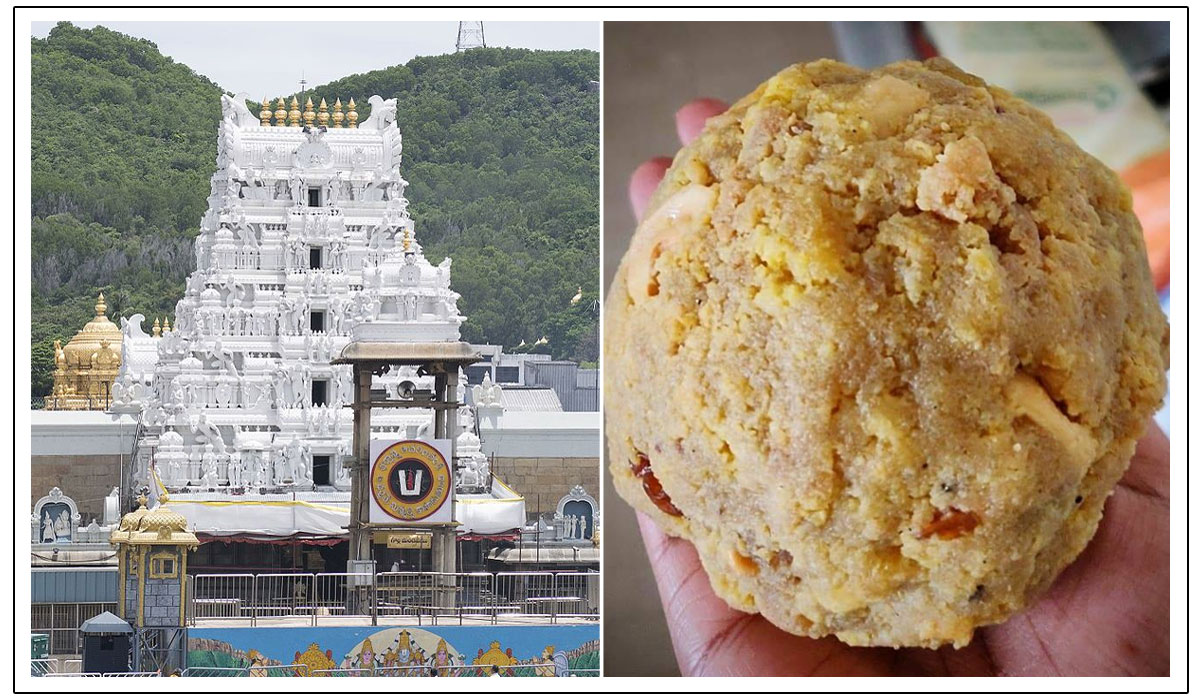Here Is Tirupati Laddu Controversy Timeline
Timeline on Tirupati Laddu Controversy

Here is Tirupati Ladoo controversy timeline.The Tirumala Laddu Controversy: A Timeline of Accusations, Reports, and Political Fallout.
The controversy surrounding the preparation of Tirumala Srivari Laddu, a sacred offering at the renowned temple, has escalated into a heated political battle in Andhra Pradesh. The dispute, touching upon religious sentiments and the sanctity of the prasadam, has captured national attention, with accusations and counter-accusations flying between the ruling Telugu Desam Party (TDP) and the opposition YSR Congress Party (YSRCP).
Bhumana Takes Oath in Tirumala Amid Allegations
The controversy started when former Chief Minister Chandrababu Naidu accused the previous YS Jaganmohan Reddy government of using substandard ingredients, including animal fat, in the preparation of the Tirumala Laddus. These claims have sent shockwaves through the Hindu community, both in India and abroad. Naidu’s accusations have been strongly refuted by the YSR Congress Party (YSRCP), which countered with its own claims, accusing Naidu’s government of orchestrating the controversy for political gain.
The Accusations and Counter-Accusations:
The controversy began when TDP chief and former Chief Minister N. Chandrababu Naidu alleged that the laddu was being made with substandard ingredients, including the use of animal fat instead of ghee, during the previous YSRCP government's tenure. These accusations sparked outrage among the Hindu community and fueled a political firestorm.
The YSRCP, led by former Chief Minister YS Jaganmohan Reddy, vehemently denied the allegations, claiming that the TDP was attempting to exploit religious sentiments for political gain. They countered with accusations of adulterated ghee during the TDP's previous reign, providing dates and test reports as evidence.
The Role of Testing Reports and Timelines
The core of the controversy lies in the testing reports of the ghee used for the laddus. Naidu cited reports from the National Dairy Development Board (NDDB), which allegedly detected animal fat in the ghee, sparking the accusations. However, the ghee supplier, AR Dairy, and SMS Labs, which conducted the tests, both reported no evidence of adulteration. The reports from the Tirumala Tirupati Devasthanams (TTD) Water and Food Analysis Lab, while acknowledging some limitations in their testing capabilities, also indicated no signs of tampering.
The Timeline of Events:
June 4: AP Assembly election results declared, with the TDP emerging victorious.
June 12: Chandrababu Naidu and his cabinet take oath.
June 16: Chandrababu appoints a new Executive Officer (EO) for TTD, a key position in temple administration.
June - July: Several ghee samples are collected and sent to SMS Labs Pvt Ltd, a private laboratory, for testing by both TTD and AR Dairy, the ghee supplier.
July 6 & 12: TTD's Water and Food Analysis Lab collects ghee samples.
July 9 & 17: NDDB (National Dairy Development Board) collects ghee samples for testing.
July 13: TTD's Water and Food Analysis Lab submits its second report, indicating that their laboratory lacks the capacity to determine certain key indicators of adulteration.
July 23: NDDB releases its final report, suggesting potential adulteration but also stating that it could be a result of factors such as sample collection methods or variations in cow hormones.
July 27: TDP releases its own report based on NDDB findings, alleging adulteration during the YSRCP regime.
The Political Fallout:
The controversy has become a political weapon, with both parties attempting to capitalize on religious sentiments. The TDP alleges that the YSRCP deliberately used substandard ingredients to hurt Hindu sentiments, while the YSRCP claims the accusations are politically motivated, citing past instances of TDP targeting TTD and Hinduism.
Political Implications:
This issue is not merely a matter of food safety but has now become a focal point of political rivalry. The timeline of the ghee sample testing aligns with key political events—samples were collected shortly after the TDP assumed power in June, following the appointment of a new TTD Executive Officer. Chandrababu Naidu’s allegations came after the NDDB’s second round of testing, leading to further political clashes. The TDP-Janasena-BJP alliance has used this controversy to launch a broader attack on the YSRCP, accusing it of undermining Hindu traditions, a charge the YSRCP vehemently denies
Calls for a Full Investigation
With both sides locked in a bitter dispute, there are increasing calls for a neutral investigation into the matter. TDP leaders, including IT Minister Nara Lokesh, have emphasized that the Chief Minister should be held accountable for the controversy, while the YSRCP insists that the TTD is an autonomous body, free from government interference.
The sensitive nature of this issue, given its connection to religious sentiments, has led to demands for an impartial, full-scale investigation by a neutral agency to settle the matter once and for all.
The Need for Investigation:
Given the sensitive nature of the allegations and the potential impact on religious beliefs, a thorough and impartial investigation by a neutral agency is imperative. The controversy highlights the need for greater transparency and accountability in the management of religious institutions, ensuring that practices align with the sentiments of devotees and uphold the sanctity of the sacred sites.
As the Tirumala Laddu controversy continues to make headlines, it has become more than just a local issue. With its deep ties to Hindu tradition and religion, the matter has taken on a national and emotional significance. As political parties continue to argue over the sanctity of the laddus, only a thorough and unbiased investigation will help resolve the dispute and restore trust in the process.
Key Takeaways:
The Tirumala Laddu controversy has become a political battleground in Andhra Pradesh, fueled by accusations and counter-accusations between the TDP and YSRCP.
The timeline of events reveals a complex web of reports and conflicting claims, highlighting the need for a neutral investigation.
The controversy has highlighted the importance of maintaining transparency and accountability in the management of religious institutions, especially when religious sentiments are at stake.




 Can Devara Do A Kalki 2898 AD In Bollywood
Can Devara Do A Kalki 2898 AD In Bollywood Sathyam Sundaram Trailer Review
Sathyam Sundaram Trailer Review